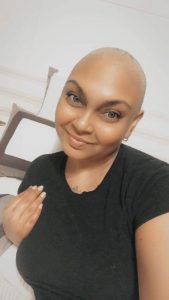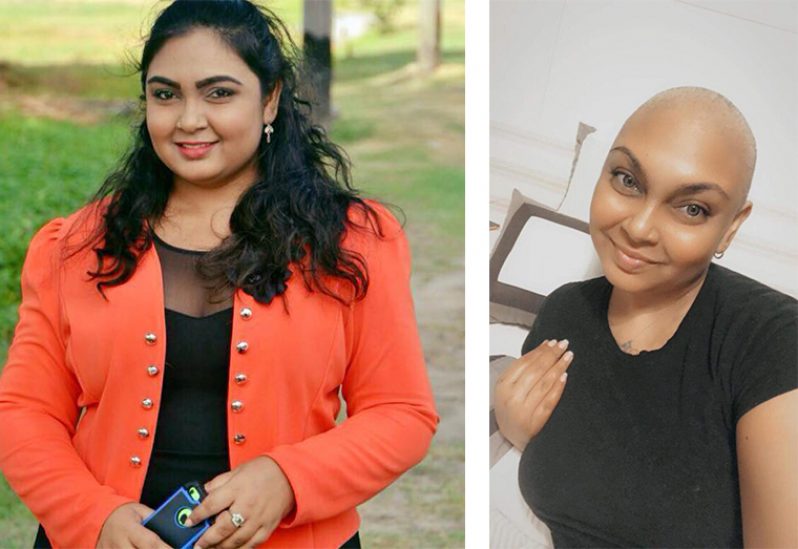….Carol Dabie tells her story
By Rehana Ahamad
EVER since Carol Dabie was a teenager, her diet consisted of contraceptives needed to regulate her hormones; for more than a decade, she had been repeatedly misdiagnosed and treated for hormonal imbalances, kidney stones and Urinary Tract Infections (UTI).
She would later find out that her irregular and excruciating periods, accompanied by constant exhaustion and weight-loss were as a result of something much worse. In November 2019, while in the United States, Dabie was diagnosed with Cervical Clear Cell Carcinoma, a rare type of cervical cancer which mostly affects women of Indian ancestry. During an interview with the Sunday Chronicle, the former media worker, now 38-years-old, recalled being told that the ovarian cysts she had developed would eventually go away on its own; years would go by and Carol Dabie would get married and begin what she thought would have been, a beautiful, blissful married life. But her health deteriorated significantly, and Dabie’s menstrual cycle consisted of even more painful and prolonged periods.

“Or sometimes no period for months,” she recalled. Dabie’s symptoms had eventually become a way of life, and the struggles would be just another component of her daily routine. This continued for a few years, until three years ago when Dabie’s health took a turn for the worse.
“I kept getting sicker. My body was getting more and more tired and doctors would relate it to my hectic lifestyle working in the media back then, while cooking and running my own catering service. [They would] just tell me to rest, and that I was suffering from exhaustion,” Dabie related. But a few months passed and Dabie’s health continued its downward spiral.
“It was in 2019; I kept getting more ill and with vomiting, and symptoms like UTI. I was treated for UTI with antibiotics, but it was of no help. I kept going back to the doctor and an ultrasound was ordered and showed that the left kidney was swollen. Then I was told I had kidney stones and was put on treatment for that,” the former Creative Director at the National Communications Network (NCN) recalled.
It didn’t take long for doctors to realise that their treatment for kidney stones was not working. “I started to get severe lower back pain to the extent where I couldn’t walk. Another doctor I saw recommended I see an urologist, which I did and after speaking with him for over two hours and him going through my medical records, he recommended I do a CT scan at the Cancer Institute of Guyana,” the young woman remembered.
The CT scan would then reveal the existence of a tumor behind Dabie’s uterus, “with swollen lymph nodes inside my pelvis.” Dr. Brian Niles of the St. Joseph Mercy Hospital quickly ordered a biopsy, which was performed by an oncologist from Georgetown Public Hospital Corporation (GPHC).
“At the same time, Dr. Niles inserted a stent inside the left kidney to help it to drain. The biopsy was sent to a lab in Trinidad. While I was waiting for that result, I got even sicker,” Dabie related.
Her father had seen these symptoms before, and wasted no time in arranging for his only daughter to be sent overseas for expedited medical attention.
“Just one day after arriving in the US, I was admitted at a city hospital in New York and another biopsy, along with another CT scan and a PET scan was done. When the results came back a few days after, I was positive with Cervical Clear Cell Carcinoma, a rare and incurable cancer that was not only in the advanced stage, but it had also metastasized (spread).”
THE HORRIFYING NEWS

“When I first got the news of the cancer I was sitting alone with the gynecologist. I asked if it can be cured and he paused and said it’s treatable but my oncologist will explain more,” Dabie recalled.
Shortly after, she was accompanied by a friend to meet with the oncologist. “I couldn’t say anything. I didn’t know what to say. All I remember was Dr. Hagopian saying that if you go back to Guyana you will not survive.”
Shattered by the news, Dabie remembered leaving the doctor’s office only to be chased by a counsellor who eventually became a major support system. “She said my doctor said he wanted her to meet me. I just remember sitting in her office crying while she tried to counsel me.”
At that time, the former producer was staying with lovable and accommodating relatives, but her biggest supporter, her father, was nowhere near. Due to circumstances, he remained home in Guyana.
“When I got home (her relative’s home in the US) that day, I deactivated all my social media accounts, turned off my phone and just locked myself in my room and cried. I was scared and I needed my dad because he was always with me when I was sick,” the emotional young woman related.
THE TRUTH ABOUT HER MOTHER’S DEATH
Although tragic, Dabie’s diagnosis would bring clarity and shed much-needed light on the once mysterious monster that killed her mother.
“She had all the symptoms but was never diagnosed,” a tearful Dabie recounted. Her mother died at the age of 48, while Dabie was just 11-years-old.
“My doctor explained this type of cancer is passed down, hereditary, and my dad confirmed that mommy had the same symptoms; from irregular period, infertility, vomiting with pains, exhaustion and rapid weight loss in her last days,” Dabie revealed.
The budding chef said that had she known about her predisposition, she would have taken better care of her health.
“I was not getting my period and it was for almost a year and didn’t take it serious. It was much better to deal with than the prolonged period I was experiencing before,” Dabie recounted. Soon enough, she would undergo an eight-hour-long surgery, and begin aggressive stint of chemotherapy.
CANCER, A DEATH, AND EXPOSURE TO COVID-19
When the COVID-19 pandemic struck the United States, Dabie was still living with relatives who she said were incredibly supportive and provided her with all that she needed to get better, even while they themselves were battling a tragedy.
“Someone in the same house I was staying in died from it [COVID-19],” Dabie revealed. She was forced into quarantine, having developed a low grade fever. Without an opportunity to mourn the death of her loved one, Dabie fell ill once more.
Although testing negative for the coronavirus, Dabie had developed an infection in her already sick kidney, and the institution where she was hospitalised had become overrun with COVID patients. She was then transferred to another hospital, but by this time, the COVID-related delays to her treatment resulted in the cancer spreading aggressively.
“More lymph nodes became infected in my left shoulders which caused me to undergo a different kind of chemotherapy called systemic chemotherapy, which was given to me once every three weeks and [I am] currently still on this.”
The emergence of the coronavirus took an even heavier toll on Dabie’s mental health, and she soon developed depression and anxiety. “I was afraid to interact with people and kept myself locked away,” she recounted. In addition to her chemotherapy, Dabie also continues to see a therapist.
THE STIGMA
The type of cervical cancer that Dabie has been diagnosed with is not caused by the sexually transmitted Human Papilloma Virus (HPV), rather, it is hereditary. But even so, Dabie said she had been secretive about her illness, since there seems to be a stigma attached to how cervical cancers are often contracted. “The sexually transmitted aspect of it,” she posited.
In an invited comment, Oncologist and Director of Outreach at the Cancer Institute of Guyana, Dr. Syed Ghazi emphasised the need for women, especially Guyanese women, to pay more attention to their reproductive health, and ensure that they are screened every few years.
“I would recommend getting pap smears,” he posited.
The oncologist specifically recommended that women pay keener attention to their menstrual cycle, since changes in periods can be indicators of many worrying illnesses, including cervical cancer. Dr. Ghazi acknowledged that in Guyana, cervical cancers can often be misdiagnosed as kidney stones.
According to the latest data published by the World Health Organization (WHO) in 2018, Guyana is ranked at number 16 in the world for cervical cancer deaths, recording 185 deaths. To this end, Dr. Ghazi lamented the fact that Guyanese often seek medical attention once they have developed illnesses, as opposed to ensuring they receive regular health screenings. As a result, many cancer patients are being diagnosed when the disease has advanced.
Meanwhile, even as she continues her fight against cancer, Dabie has been using her social media platforms to bring awareness and encourage more women to take their health seriously.
“People need to take their health more seriously; not only for cervical cancer, but all types of cancers, because only those who have experienced it truly understand what cancer patients are dealing with. It’s not easy. I had very little hope of surviving but here I am. My doctor said I am a medical miracle,” a pleasant Dabie related.




.png)









